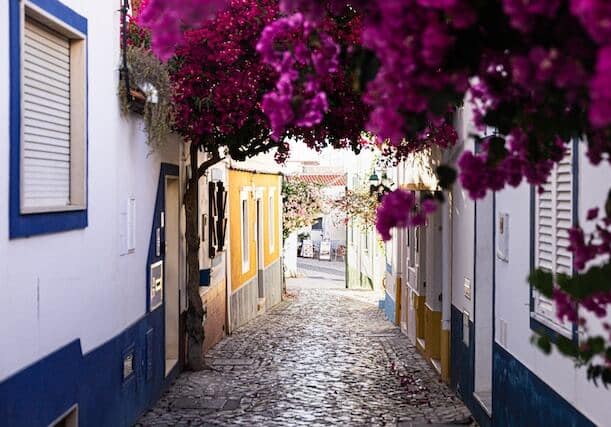Updated: April 23, 2024
Expats in Portugal can enjoy a very good quality of life, with a pleasant climate, welcoming locals, and a relaxed pace of life in this beautiful country on the Iberian Peninsula. Digital nomads, retirees, and those simply looking for a change of scenery have each moved to Portugal and found out for themselves the delights that the westernmost EU country has to offer.
In this article, we’ll provide you with an essential guide to living in Portugal as an expat. We’ll delve into working remotely in Portugal, the work environment in the country, and practical information that you should be aware of if you are considering taking the plunge and moving to the sunny south, embracing the Mediterranean lifestyle in Western Europe.
Why Expats Are Moving to Portugal

Many American expats who eventually become legal residents are attracted by the high quality of life the country has to offer and the stable Portuguese economy, from major cities like the capital of Lisbon to the scenic Algarve region. The Portuguese speak very good English, the cost of living is relatively cheap, and there is good healthcare and, affordable health insurance, modern infrastructure – and Portugal is a safe country. Each of these reasons adds to what makes Portugal a popular destination and a favorite option to live in Portugal as an expat.
Portugal is home to expats from all over the world. It’s been reported that out of a population of approximately 10 million, over 900,000 were American expats, British expats or other foreign residents from EU countries or are non-EU citizens. In the hotspot locations, you should be able to meet many fellow expats easily enough. For example, in Lisbon and Porto, there are many meetup groups in the city, Facebook groups, and events. In the Algarve, you similarly have many places to meet expats, for example, at a yoga or tennis class. It is good to get involved in activities to meet fellow expats. If you are looking into living in Portugal, you will find valuable insights in our e-book, Your Expert Guide to Buying Property in Portugal where we provide you with in-depth information on the buying process and what it is like to live in Portugal.
Cost of Living for Expats in Portugal, Western Europe
Living in Portugal as an expat is relatively cheap compared to other European countries. Note that if you venture into luxury restaurants in major cities like the Lisbon region and Algarve coast, be prepared to pay international prices.
Living costs will invariably depend on an expat’s average salary. In general, a coffee will cost you around €1.58, and a hearty Portuguese meal in a tasca (Portuguese restaurant) will cost you no more than €10.
Note that the cost of living in Lisbon can be more expensive than in the rest of Portugal, but even so, you should be pleasantly surprised by the prices. Household essentials are generally cheaper than in other European countries, particularly if you buy locally.
House prices in Portugal
House prices in Portugal are very affordable when compared to other countries in the European Union. However, the Lisbon region and the Algarve region have their own price range compared to the rest of the country so bear this in mind. In Lisbon, the Portuguese capital, the average asking house price for a house in the city was €6,009 per square meter. In Porto, hot on Lisbon’s heels as the coolest city is the county, house prices stood at €4,296 per square meter.
In the Algarve, you will be able to find some spectacular properties, and average prices stood at €3,897 per square meter in 2023. In the Alentejo, where the Portuguese locals spend their holidays, is a great place to consider with cheaper property prices if you are looking for a quiet escape in the heart of the Portuguese countryside.
Note that luxury buyers can expect to pay significantly more. Despite this, even luxury property in Portugal tends to be more affordable than in other European countries. Our article Cheap Houses with Pool: Affordable Property in Portugal can guide you in finding the property investment of your dreams if you are considering moving to Portugal.
Finding the Best City to Live in Portugal
Portugal is a diverse country with many exciting cities and beautiful landscapes. Determining what you are looking for will help you hone in on the Portuguese city you will find perfect for living in Portugal. For example, to be in a bustling city, Lisbon is the place to be, the Algarve is for the sunseekers, and the Silver Coast is for those looking for an “authentic” Portuguese experience. Here, we outline some of the most desirable locations and our article on the Top Ten Places to Live in Portugal will offer more insight.
There are many other potential locations, so it is worth speaking with a Goldcrest advisor who can discuss the best option for you – you can book a call.
Lisbon

Its proximity to beautiful beaches, its claim as the sunniest capital in Europe, and the thriving art scene each create a unique city where something always seems to be going on. The architecture of the city is also very special. These days, there are several trendy coffee shops and brunch spots to work from, so remote workers can mix up their work habits. There are also several co-working spaces in the city to consider – also very good ways to meet fellow expats and Portuguese people from all walks of life.
There are several neighborhoods in Lisbon to consider, and our article, Best Neighborhoods in Lisbon, will guide you through some of the best spots to live in central Portugal.
Consider also Cascais, the bustling seaside town, a short 30-minute drive from the bright lights of Lisbon, which is also an excellent option.
Porto

The historic city has been the inspiration for JK Rowling’s Harry Potter novels – see the Livraria Lello Bookshop – and there are many hip coffee shops and trendy bars, given that the city is a buzzing university town.
When it comes to living in the city, there are several options. If you want the hustle and bustle of the city, you can live in the historic center. Elsewhere, Foz do Douro provides you with the best of both worlds – the sea and the city – and would be an excellent option. Particularly if you are moving with a family, there are spacious houses, and you can take walks along the long promenade with spectacular views of the Atlantic.
The Algarve

If you are undecided on the best areas of the Algarve for you, in the center, you will be able to find luxurious Algarve real estate options with all the perks that you could want – a swimming pool, security, and a private gym. For the adventurous, consider the West, where you have excellent water sports locations.
The east, close to Tavira, is where you will find a more ‘authentic’ Portugal, which is quieter and less touristy. Each could provide an excellent place to live for an expat in Portugal.
The Silver Coast

The Silver Coast provides property investments at an affordable cost, close proximity to mainland Portugal, and incredible Portuguese food – particularly seafood. There are incredible properties on the Silver Coast that have sweeping views of the Atlantic Ocean. In many towns on the Silver Coast, there remain vibrant traditions.
Take Nazaré, where the fishermen’s wives still wear their colorful traditional skirts, wooden clogs, and black headscarves. Fishing is synonymous with the Silver Coast and in many of the towns you can see the fishermen drying their catch in the sun.
Practical Information for Expats Living in Portugal
Moving to a new country can be daunting. Here, we have provided you with some practical information about the process of moving to Portugal and the ins and outs of living in Portugal as an expat, from opening a bank account and learning basic Portuguese to pursuing permanent residency and eventually Portuguese citizenship.
Working in Portugal
Portugal is notorious for its low salaries, in comparison with other European countries. However, it is worth bearing in mind that the Portugal cost of living is also more affordable, particularly if you are not living in Lisbon.
Given its high dependency on foreigners, hospitality and tourism are some of the most popular job types in Portugal. Tech-related jobs in IT are also increasing, and customer service is normally sought after and if you apply for a Work Visa you will find that there are many jobs for expats in Portugal.
Digital nomads enjoy the possibility to work as a freelancer, or remotely from Portugal with an array of benefits. You can enjoy the affordable quality of life, on (hopefully) a good salary, allowing you to save money for when you will later need it, say to make a down payment on a house or for investment opportunities.
Many international startups and tech companies have relocated to Portugal. Particularly in Lisbon, and increasingly Porto, you will find numerous startups. Expats looking to set up a startup here are in good company, and Portugal’s stable economy is an added bonus for those looking to kickstart their own business.
Tax in Portugal for expats
British expats in Portugal and American expats in Portugal could enjoy significant tax benefits through the Non-habitual Residence (NHR). Portuguese tax authorities and a fiscal representative are there to assist with dealing with tax obligations and double taxation agreements and have put in place the NHR status for foreign residents, which is a special tax status for new Portuguese residents from a non-EU country.
In addition to low-cost Portugal living in one of the safest countries in the European Union, the NHR tax incentives will allow expats to live with tax incentives for ten years when they need to pay taxes such as income tax and transfer tax if your tax scheme is if structured correctly and you have a Portuguese tax number.
In November 2023, the Portuguese government approved plans to end the end of the NHR tax regime. you can learn more about these changes and the requirements to qualify for the NHR tax regime in 2024 in this article, NHR Portugal: Full Guide and Eligibility Test, by our partner, Global Citizen Solutions.
Healthcare as an expat in Portugal
The National Health Service (Serviço Nacional de Saúde) (SNS) is free for residents living in Portugal and who are registered income tax payers with a residence permit. If any, you will only need to pay a minimum cost for treatment. X-rays, scans, and other treatments and tests will require additional fees. Private healthcare has really come into its own in Portugal, with many practitioners across the country. Although the Portuguese language is still the main language of communication, English is now widely spoken in the Portuguese healthcare system making it easy for you to understand processes and procedures as American expats.
Education in Portugal
The Portuguese education system provides a mixture of private and public schools as well as prestigious international schools. The government has recently reinvested in state-of-the-art facilities and education materials for public schools. The private sector generally has a smaller class size, more extracurricular activities, and more modern facilities. The many international schools in Portugal, offer high standards of education. Take Lisbon, Cascais, or Porto, and you will find an excellent choice of schools offering world-class education in Portuguese and English language while also educating American expats on the country’s culture.
Getting around as an expat in Portugal
Public transport in Portugal is, generally speaking, affordable, convenient, and fast. By far, the easiest way for Americans living in Portugal to get around is by car, and, as Portugal is a very small country, you can travel from north to south in under eight hours.
When it comes to public transportation, the train links are fairly well-developed and affordable, and buses are even cheaper. When it comes to city public transport, Lisbon and Porto both have excellent metro systems. You can also get monthly tickets which are very cheap.
Cycling is becoming more popular despite the abundance of hills in cities such as Lisbon, with more cycle lanes opening across the cities in the country and electric bikes increasingly becoming a common way to get around the city.
Visa Options for Expat Life in Portugal
The first and most important factor to consider when moving to a country is to determine how you are legally going to be able to reside in the country. If you are an EU national, the process of gaining a Portuguese residence permit is straightforward, given that it is free to live, work, and travel in the country. For non-EU citizens in search of a residence permit and eventually becoming an EU citizen, however, consider the following options the Portuguese authorities offer many expats for moving to Portugal and obtaining Portuguese residency.
 The Portugal Golden Visa Program
The Portugal Golden Visa Program
The Portugal Golden Visa, introduced by the government in 2012, has become one of the most popular and successful residency-by-investment programs in the world. The scheme provides investors with an entryway to other EU member countries and the opportunity to become a Portuguese citizen.
Investors must make a qualifying investment to be eligible for the program, and there are a number of different pathways to qualifying for the Portugal Golden Visa Program, with the most popular being through business investments and investment funds.
 The D7 Visa
The D7 Visa
For American expats considering moving to Portugal and obtaining permanent residency with their own funding, the Portugal D7 visa is your best option. This allows non-EU citizens to obtain residency in Portugal as long as they have sufficient means in the form of passive income to support themselves during their stay in Portugal.
The D7 Visa is a great option for retirees and entrepreneurs interested in moving to Portugal, without having to make a major financial investment. You can also secure residency through marriage and by studying.
Frequently asked questions about being an expat in Portugal:
Is Portugal good for expats?
Yes, Portugal is a very good country for expats, with a low cost of living, affordable houses and a good quality of life. Factor in an incredible cuisine, many beautiful locations, and an array of beaches to choose from – indeed there are many reasons to live in Portugal.
What are the property prices in Portugal?
House prices in Portugal are very affordable when compared to other countries in Europe. In Lisbon, the Portuguese capital, the average asking house price for a house in the city was €6,009 per square meter. In Porto City, house prices stood at €4,296 per square meter.
In the Algarve, you will be able to find some spectacular properties, and average prices stood at €3,897 per square meter in 2023. Those looking for luxury properties should expect to pay more. However, compared to their equivalents in other countries, the prices are also more affordable.
What is the cost of living in Portugal?
The cost of living is generally more affordable than the EU average in other European countries, from property prices down to household goods. If you are moving to Portugal, you should still be pleasantly surprised.
